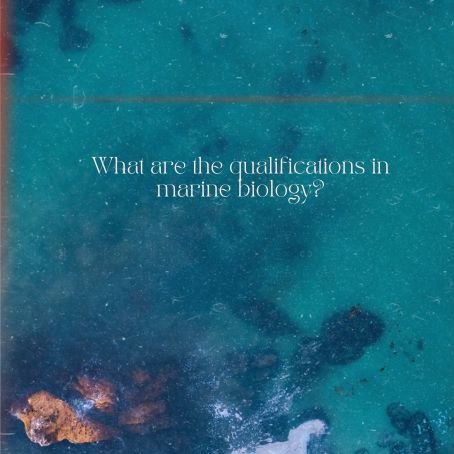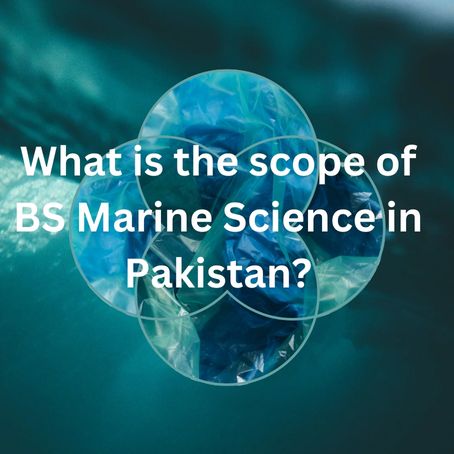The Scope of BS Marine Science in Pakistan
Marine Science is a global body of integrated disciplines which is as broad and far-reaching as the study of oceans, seas, and the systems that encompass them. However, the academic and professional opportunities are enormous. In Pakistan, the coastline borders measure 1046 kilometres with the Arabian Sea; hence the scope of BS Marine Science is broad. This article is concerned with the marine sciences with a focus on the scope of BS Marine Science in Pakistan such as educational aspects, job opportunities, socio-economic importance of the country, and the potential of marine resources in the economic development of the country.
Overview of Marine Science
Marine science is a littoral science that is defined by several domains which include marine biology, oceanography, marine geology, and environmental science. Students in a BS Marine Science programme are exposed to marine ecosystems, biotic diversity, and the potential to exploit marine resources sustainably. Graduate students are trained both theoretically and practically during fieldwork, research, and laboratory experiments.
Pakistan’s Marine Resources: A Goldmine of Possibilities
There is a lot of fishing in the EEZ of Pakistan which stretches its borders to 240,000 square kilometers and encompasses a lot of minerals, hydrocarbons, and renewable sources of energy. Pakistan occupies an important geographical spot at the rim of the coast and promotes and supplements Pakistan’s interests in strengthening marine trade and regional interaction thus augmenting the need for marine science professionals.
Fisheries and Aquaculture
Pakistan has a fishing industry and fisheries that employ millions of its citizens and play a vital role in its economy. Exponential growth is palpable in the industry considering the diversifications in aquaculture and the use of sustainable fishing models. Marine science graduates can contribute significantly in:
- Improving fish farming systems.
- Setting up systems for the regulation and implementation of fishing policies for the sustainability of the fish population.
- Establishing frameworks for the protection of fish species in marine ecosystems.
Marine Minerals and Hydrocarbons
The fisheries sector and fishing are very important aspects for the development of any country and just like the resources found beneath the seabed along the Pakistani coastline, the integration of marine geology and oceanography for marine professionals is vital for the exploration and harvesting of such resources. However, with a marine science degree, one could:
Conducted reconnaissance to map the ocean seafloor and locate mineral or resource deposits.
- Partner with energy firms for shallow or deep-water oil and natural gas development.
- Investigate the consequences of resource exploration and extraction on the planet.
Renewable Energy Potential
To make use of the wave and tidal energy that Pakistan’s coast has to offer, the country has a promising future in terms of the manpower available in the marine science sector. They can pursue jobs like:
Advancing and supplying research for alternative energy resources.
Managing energy projects while conducting environmental impact assessments.
Collaborating with firms and government entities to make sustainable energy approaches possible.
Career Prospects for Marine Science Graduates
Marine Science Bachelors oftentimes do not struggle to find jobs in Pakistan and even overseas. Government bodies, private firms, research centres, and NGOs seek Marine Science graduates.
Government Organisations
To support the country’s economy, marine science professionals are employed in:
Pakistan Navy: Assisting the Navy’s efforts through extensive oceanographic studies.
Marine Fisheries Department: Further contributing to fisheries protection and regulation efforts.
NIO: Engaging in oceanographic investigations, shoreline changes, as well as effects resulting from climate changes and flora and fauna interactions.
Private Sector Opportunities
Such graduates can also work at private entities such as:
Throughout the maritime world, oil and gas offshore corporations.
Companies working in conducting consultancy and projects aimed at environmentally friendly methods.
Moving and communication firms that require skills in the shipping industry.
Academic and Research Institutions
Starting a career in teaching and researching is also an option which involves:
- Conducting classes in institutions on the subject of marine sciences.
- Addressing the challenges concerning climate change and pollution while gaining a deeper understanding of marine ecosystems.
- Taking part in collaborative international projects directed towards marine research.
- Planning and executing management initiatives.
- Training fisher folk on appropriate practices.
- Leading campaigns targeting marine policies.
Challenges
- Lack of Awareness: A large number of students and their guardians do not have enough information regarding the job opportunities available in marine sciences resulting in very few numbers taking up courses in this field.
- Limited Research Funding: Technology and creativity blossom in an environment nurtured by adequate budgetary allocations. Marine research sorely lacks such budgetary requirements.
- Environmental Degradation: Marine biodiversity is at danger of widespread pollution, over-exploitation, as well as climate change which must be addressed right away and with lots of resources.
Opportunities
Blue Economy Development: The government of Barrie sets a blueprint of a sustainable approach towards the usage of ocean resources through their policies aimed at creating a blue economy in Pakistan.
Technological factors: New technologies in underwater research and their preservation broadens the options available to specialists in the sphere.
The Coefficient of universities
Pakistani students are fortunate to find a number of institutions specializing in educational programmes in marine science as the sub-continent has never had a marine scientist of repute. Some of these distinctive institutions are:
Institute of Marine Science and Technology (IMST): The institute studies the available marine resources and practices in coastal zone management.
These institutes work with many local and international programs in order to give students experience in international standards in marine studies.
Economic and Environmental Applications
Pakistan’s marine science has an important contribution to economic development and environmental protection. Engaging in the sustainable development of marine resources allows Pakistan to:
Future Outlook
The future of BS Marine Science in Pakistan appears bright in light of increasing factors advocating for the use of marine resources. Notable factors encouraging growth include:
Increase in government funding for marine exploration and the blue economy.
The need for marine science experts in public and private sectors.
improvement in technology leading to enhanced exploration and management of marine ecosystems.
What are the qualifications in marine biology?

Marine Biology Biology Environmental Studies Oceanography Ecology or Zoology Time Frame: Usually 3-4 years. Modules: Marine biology of ecosystems Introduction to oceanography Surveying aquatic species The aspects of inheritance and evolution Preserving marine ecosystems and resources
voice read
Marine biology Marine conservation Aquatic ecology Fisheries Marine biology Time Frame: 1-2 years. Module Focus: In-depth specific or regional studies (Biodiversity in the Great Barrier Reef, Tropical Beaches, Marine Debris) Cutting-edge observational and experimental techniques Analytical and computational approaches 3. Doctoral Degree (PhD) Major
The Marine Ecosystem Nanobiotechnology Effects of Toxicants in Organisms Management of Marine Resources Time Frame: 3-6 Years. Overview of Purpose: Research focused on previously unexplored areas Targeted towards graduates aspiring for a career in research, on an institutional or industrial level Focussing more on creating new theories as opposed to validating existing knowledge
Certifications and Training: Diving Certification: Recommended if working on further deep sea or coral reef ecosystems. GIS (Geographic Information Systems): Important in the representation and evaluation of marine ecosystems. Marine Field Techniques: Usually developed and delivered in the form of short courses by universities or marine research organizations. Data Analysis Tools: Expertise in R, Python or MATLAB for the purpose of research data interpretation
Skills and Experience Fieldwork: Possess hands-on experience with different marine environments such as intertidal, oceans or deep seas. Research and Analytical Skills: In order to carry out experiments, obtain data, and analyse the results. Communication Skills: Preparation of research reports, scientific papers and other forms of presentation of research results. Team Collaboration: Engaging with researchers, conservationists, or government offices.
Additional Pathways Work placements with marine research institutions Participation in conservation efforts Taking part in marine travels or other environmental works What are some other activities that can assist one in pursuing marine biology along with various institutions providing these qualifications do you need more details about?

